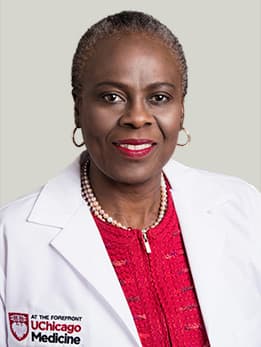
Olufunmilayo I. Olopade, MD
Olufunmilayo I. Olopade, MD
Walter L. Palmer Distinguished Service Professor of Medicine
Director, Center for Clinical Cancer Genetics and Global Health
Specialties
- Hematology and Oncology (Cancer)
Locations
- Chicago - Hyde Park
- About
- Specialties & Areas of Expertise
- Locations & Patient Information
- Education & Research
- Accepted Insurance
- External Professional Relationships
Olufunmilayo I. Olopade, MD, FACP, is an expert in cancer risk assessment and individualized treatment for the most aggressive forms of breast cancer, having developed novel management strategies based on an understanding of the altered genes in individual patients. She stresses comprehensive risk reducing strategies and prevention in high-risk populations, as well as earlier detection through advanced imaging technologies.
Dr. Olopade is internationally renowned for her expertise in breast cancer, and her research has advanced early detection, treatment and prevention of breast cancer in women at high risk for the disease. A distinguished scholar and mentor, Olopade has received numerous honors and awards including honorary degrees from six universities and a 2005 MacArthur Fellowship (“Genius grant”) for “translating findings on the molecular genetics of breast cancer in African and African-American women into innovative clinical practices in the United States and abroad.”
Dr. Olopade has received numerous honors and awards, including honorary degrees from North Central, Dominican, Bowdoin and Princeton universities. She is also a recipient of the Doris Duke Distinguished Clinical Scientist and Exceptional Mentor Award, an American Cancer Society Clinical Research Professorship, a MacArthur Foundation "Genius" Fellowship and Officer of the Order of the Niger Award. Dr. Olopade is an elected member of the American Academy of Arts and Sciences, the American Philosophical Society and the National Academy of Sciences. She currently serves on the board of directors for the American Board of Internal Medicine, the National Cancer Advisory Board, Susan G. Komen for the Cure, Cancer IQ and the Lyric Opera.
Specialties
Areas of Expertise
- Hereditary Cancers
- Cancer Risk and Prevention
- Cancer Genetics
- Breast Cancer
- Clinical Trials
Board Certifications
- Internal Medicine
- Medical Oncology
Practicing Since
- 1980
Languages Spoken
- English
- Yoruba
Medical Education
- University of Ibadan
Internship
- University College Hospital; John H. Stroger, Jr. Hospital of Cook County
Residency
- John H. Stroger, Jr. Hospital of Cook County
Fellowship
- University of Chicago Medicine
Memberships & Medical Societies
- American College of Physicians
- American Association for Cancer Research
- Women in Cancer Research
- American Philosophical Society
- American Society of Breast Disease
- American Society of Clinical Oncology
- American Association of University Professors
- Human Genome Organisation
- American Society of Preventive Oncology
- American Association for the Advancement of Science
- American Society of Hematology
- National Academy of Medicine
- Nigerian Medical Association
- National Cancer Advisory Board
- American Society for Clinical Investigation
News & Research
Insurance
- Aetna Better Health *see insurance page
- Aetna HMO (specialists only)
- Aetna Medicare Advantage HMO & PPO
- Aetna POS
- Aetna PPO
- BCBS Blue Precision HMO (specialists only)
- BCBS HMO (HMOI) (specialists only)
- BCBS Medicare Advantage HMO & PPO
- BCBS PPO
- Cigna HMO
- Cigna POS
- Cigna PPO
- CountyCare *see insurance page
- Humana Medicare Advantage Choice PPO
- Humana Medicare Advantage Gold Choice PFFS
- Humana Medicare Advantage Gold Plus HMO
- Medicare
- Multiplan PPO
- PHCS PPO
- United Choice Plus POS/PPO
- United Choice HMO (specialists only)
- United Options (PPO)
- United Select (HMO & EPO) (specialists only)
- United W500 Emergent Wrap
- University of Chicago Health Plan (UCHP)
Our list of accepted insurance providers is subject to change at any time. You should contact your insurance company to confirm UChicago Medicine participates in their network before scheduling your appointment. If you have questions regarding your insurance benefits at UChicago Medicine, please contact our financial counseling team at OPSFinancialCounseling@uchospitals.edu.
Some of our physicians and health professionals collaborate with external pharmaceutical, medical device, or other medical related entities to develop new treatments and products to improve clinical outcomes for patients. In some instances, the physician has ownership interests in the external entity and/or is compensated for advising or speaking about the entity’s products or treatments. These payments may include compensation for consulting and speaking engagements, equity, and/or royalties for products invented by our physicians. To assure objectivity and integrity in patient care, UChicago Medicine requires all physicians and health professionals to report their relationships and financial interests with external entities on an annual basis. This information is used to review relationships and transactions that might give rise to potential financial conflicts of interest, and when considered to be significant a management plan to mitigate any biases is created.
If you are a patient at UChicago Medicine and would like more information about your physician’s external relationships, please talk with your physician. You may also visit the Centers for Medicare & Medicaid Services (CMS) Open Payments website at https://openpaymentsdata.cms.gov/ . CMS Open Payments is a national disclosure program that promotes a more transparent and accountable health care system. It houses a publicly accessible database of payments that reporting entities, including drug and medical device companies, make to covered recipients like physicians and hospitals.
Information in the CMS Open Payments database could potentially contain inaccurately reported and out of date payment information. All information is open to personal interpretation, if there are questions about the data, patients and their advocates should speak directly to their health care provider for a better understanding.
